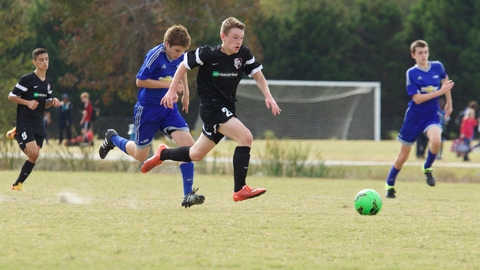
I was shocked and dismayed recently when one of my senior (adult) players disappeared from training for a week with no contact. It was only days later I received word that he was laid up in hospital with heart problems. Definitely not what I was expecting to hear about a 22 year old.
Thankfully he's been released from hospital now and been told that he can continue playing which is great news. It has motivated him to look closely at different aspects of his lifestyle, notably his diet. I know that he's a big consumer of energy drinks and has been told to cut these out completely which I find interesting given how popular they are.
The whole affair prompted me to consider if, as our diets have worsened over the last 30 years, whether our young footballers are receiving the nutrition they need to support them with the physical demands of the game.
Whilst some players and their parents may obsess over the latest football boots and us coaches preach different tactical formations, is one of the most powerful performance enhancers being largely overlooked in the kit bag, i.e. what our young athletes are eating and drinking?
The reality is stark but straightforward – young people's eating habits are getting worse, consuming larger quantities of fats and free sugars than recommended whilst eating less than five portions of fruit and vegetables per day. For our grassroots footballers whose bodies are simultaneously growing, developing, and being pushed physically, poor nutrition doesn't just impact weekend performance, it can fundamentally limit their potential.
Football places big demands on the human body. A typical youth match involves over 1,000 changes of direction, hundreds of sprints, countless jumps, and covering distances of up to 10 kilometres for older age groups. Each explosive movement, and all sustained running draws primarily on the body's carbohydrate stores. When these fuel tanks run empty, which happens really quickly in poorly fuelled players, their performance inevitably deteriorates. The young footballer who fades in the final twenty minutes, loses concentration during crucial moments, or suffers recurring injuries may not be unfocused or lack talent, but just be missing the right fuel.
A bit of research shows that not all carbs are created equal, and timing matters enormously.
Simple sugars from sweets, fizzy drinks or energy drinks provide rapid energy but create dramatic blood sugar swings that can lead to performance crashes. Complex carbohydrates from sources like porridge, wholemeal bread, brown rice and sweet potatoes offer sustained energy release, maintaining stable blood glucose levels throughout matches and training sessions.
A meal rich in carbohydrates and protein should ideally be eaten 2-3 hours before a game, allowing sufficient time for digestion whilst ensuring energy stores are topped up. Meals like pasta with chicken and vegetables, jacket potato with beans or a bowl of porridge with banana. Whilst they're hardly exotic foods, they're simple, effective and accessible meals that can dramatically aid how a young player performs.
Protein plays an equally vital role, particularly for growing footballers whose bodies are constantly repairing exercise-induced muscle damage whilst building new tissue. Protein rich foods include fish, lean meat and poultry, but excellent alternatives exist for people seeking variety or following plant based diets. Eggs, beans, lentils, nuts and dairy products all provide high quality protein that supports muscle development and recovery. The key lies in distributing protein intake throughout the day rather than consuming it primarily at one meal time as this ensures amino acids are consistently available when muscles need them most.
Young footballers face unique nutritional challenges that adult players don't encounter. Their bodies are simultaneously fuelling intense physical activity whilst supporting rapid growth spurts that can see teenagers gain several inches and significant muscle mass within a single year. This physiological transformation requires not just adequate calories, but the right balance of nutrients delivered at optimal times. Iron deserves particular attention, as iron deficiency can cause premature fatigue, poor recovery and increased injury susceptibility.
Sometimes we mistake these symptoms for lack of fitness or motivation. Iron rich foods include lean meat, chicken, tuna, salmon, eggs, dried fruits, leafy green vegetables and fortified whole grains.
Hydration represents perhaps the most immediate and controllable performance factor, but is often mismanaged at our level of football. When it comes to hydration for children during grassroots games, water is the superior choice over energy drinks that often contain excessive sugar and caffeine. Even mild dehydration, as little as losing 2% of body weight through fluid, can reduce cognitive function, increase perceived exertion and impair temperature regulation. The player who arrives at training having consumed insufficient fluids throughout the school day starts at an immediate disadvantage.
Drinking before, during and after exercising is the best way to stay hydrated. It's important to encourage players not to wait until they're thirsty, as thirst sensations lag behind actual fluid needs. A simple check involves monitoring urine colour. Pale yellow indicates adequate hydration, whilst darker colours suggest fluid deficits that will impact performance. Begin hydrating 24 hours before a match and aim to consume 500-600 ml of fluids every few hours to ensure optimal preparation.
The timing of meals and snacks around football activities requires a bit of planning to optimise energy availability whilst avoiding digestive discomfort. Eating too close to kick off can cause stomach upset and sluggishness, while eating too early may result in energy depletion during crucial moments. The pre match snack window, roughly 60-90 minutes before activity, presents an opportunity to top up energy stores with easily digestible options like bananas, dates or small amounts of diluted fruit juice.
Post exercise nutrition is virtually always neglected but offers a critical opportunity for optimising recovery and adaptation. A snack or meal rich in protein and some carbohydrates within 30 minutes can help with recovery. This 'golden window' represents when muscles are primed to absorb nutrients and begin repair processes. Chocolate milk, despite its simplicity, provides an almost ideal recovery combination of carbohydrates and protein. However, whole food alternatives like a chicken sandwich, yoghurt with fruit or a homemade smoothie can prove equally effective whilst avoiding excessive sugar and artificial additives.
I know many families juggle multiple commitments, with limited time for meal preparation between work, school, training schedules and matches. Cost of living pressures also presents another layer of challenge. The temptation of convenience foods becomes understandable when viewed through this lens, yet simple strategies can dramatically improve nutritional quality without making it difficult.
Batch cooking on weekends transforms busy weekday evenings. Preparing large quantities of bolognese sauce, chilli, or curry that can be portioned and frozen provides instant healthy meals when time is scarce. Slow cookers become invaluable allies, allowing parents to prepare nutritious stews and casseroles with minimal morning effort. Investing in quality food containers enables families to prepare easy options like overnight oats, pasta salads or homemade energy balls that support training schedules.
As mentioned, financial constraints represent another significant barrier, with many families already stretched by subs, kit and travel expenses. However, optimal nutrition doesn't always mean premium prices. Frozen vegetables retain their nutritional value whilst costing significantly less than fresh alternatives. Tinned fish provides affordable omega 3 fatty acids that support brain development and reduce inflammation. Eggs represent one of the most cost effective and complete protein sources available, whilst pulses, lentils and beans offer excellent nutrition at minimal cost.
Adult behaviours around food inevitably influence developing attitudes. Coaches and parents who consume energy drinks and processed snacks whilst encouraging players to 'eat well' send mixed messages that undermine these efforts. Creating environments where healthy choices are normal, accessible and rewarded becomes crucial for lasting behaviour change.
Ironically, it might be one of the other big dangers to player welfare, technology, that offers promising ways for improving nutritional awareness among young footballers. Smartphone apps can track hydration, plan meals and provide education through gamification that appeals to young people. Simple tools like hydration reminder apps or meal planning platforms can support families in developing sustainable healthy habits that extend beyond football.
The relationship between sleep, nutrition and athletic performance is a close and sophisticated one. Poor dietary choices can significantly impact sleep quality and recovery, whilst inadequate sleep disrupts appetite regulation and increases cravings for processed foods. Young footballers consuming high sugar foods or caffeinated drinks close to bedtime not only miss their recovery time but also actively sabotage their nutritional goals.
Any conversation around nutrition in grassroots football is ultimately shaped by broader societal challenges around food culture, education and health promotion to young people. The same factors limiting optimal nutrition among young footballers such as time constraints, financial pressures, conflicting information and entrenched habits, affect millions of families across the UK. Addressing these challenges within the football world offers opportunities for wider community impact, using sport's unique motivational power to drive positive change extending far beyond the pitch.
The food choices made today won't just influence this weekend's performance, but put in place good habits for life.


















